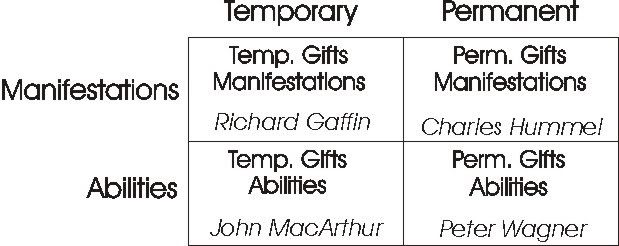The overtly miraculous gifts are not a central part of the gift-type theory. I consider them to be the least interesting gifts, but the theory raises some questions about them, and a brief analysis would be worthwhile. The following is no more than a rough outline of some ideas on the topic.
The gifts of miracles, healing, tongues, and interpretation are separated from the others by their overtly miraculous nature; but what else can we deduce about them? First, the theory implies neither a cessation nor a continuation of these gifts. Such arguments must be made on other grounds. Second, these gifts could occur as a manifestation only, or there could be an ability behind the manifestation, as with the other 16 gifts. This gives us four combinations, each of which has mainstream support.

If these four “gifts” are / were manifestations only, with no permanent abilities behind them, then they most likely work through whichever of the 16 gifts a person has which defines their part in the body of Christ. In this case, they could be classified as not gifts at all. In favor of this “manifestation only” position are several points.
There are also arguments against the “manifestation only” position.
Although the first position seem slightly more likely, neither is determinative for the gift-type theory. There are more conceptual difficulties, however, with both of the ability views. If they are / were abilities used at will, then what is the nature of these gifts? The other 16 gifts are characterized by ways of perceiving information and then making decisions based on those perceptions. Would the miraculous gifts have new perceiving and judging capacities of which we are unaware? Would these capacities be beyond our ability to detect, or be so unusual that we could not decipher them if we did detect them? We have no way of knowing unless we can clearly identify people with these gifts and study them.
The gifts of miracles, healing, tongues, and interpretation are separated from the others by their overtly miraculous nature; but what else can we deduce about them? First, the theory implies neither a cessation nor a continuation of these gifts. Such arguments must be made on other grounds. Second, these gifts could occur as a manifestation only, or there could be an ability behind the manifestation, as with the other 16 gifts. This gives us four combinations, each of which has mainstream support.

If these four “gifts” are / were manifestations only, with no permanent abilities behind them, then they most likely work through whichever of the 16 gifts a person has which defines their part in the body of Christ. In this case, they could be classified as not gifts at all. In favor of this “manifestation only” position are several points.
1. These four “gifts” are only listed in the I Corinthian 12 list. This may be because they are only manifestations and have no gift or ministry component, and therefore would not have an appropriate place in the other two lists.
2. Each one is a plural in the Greek, and three of the four are double plurals: Gifts of healings, workings of powers, kinds of tongues, and interpretation of tongues. There would be no need for multiples of the same gift, if the gift was a permanent endowment.
3. As pointed out in the “categories of gifts” section, no one has ever identified any matching personality or character traits of these gifts. This suggests that these four “gifts” do not reside in us as abilities.
There are also arguments against the “manifestation only” position.
1. Healing is clearly labeled a gift (charismata) in I Cor. 12:9. This is a problem if we are trying to maintain a clear distinction between the gifts (charismata) of Romans 12 and healing as a “manifestation” only. Although Paul could be making the point that even the manifestation is a “gift” to the person who receives it, this explanation is not very satisfying. Paul could also be suggesting that, while most gifts should have the Spirit manifest through them, some “gifts” are contained in the manifestation.
2. The “gift” of discernment is also a double plural, “gifts of discernments.” This could suggest that the plural nature might be true of the manifestation of any gift. Even permanent gifts need repeated manifestations of the Spirit operating through them to be edifying to the body.
Although the first position seem slightly more likely, neither is determinative for the gift-type theory. There are more conceptual difficulties, however, with both of the ability views. If they are / were abilities used at will, then what is the nature of these gifts? The other 16 gifts are characterized by ways of perceiving information and then making decisions based on those perceptions. Would the miraculous gifts have new perceiving and judging capacities of which we are unaware? Would these capacities be beyond our ability to detect, or be so unusual that we could not decipher them if we did detect them? We have no way of knowing unless we can clearly identify people with these gifts and study them.
powered by performancing firefox
No comments:
Post a Comment